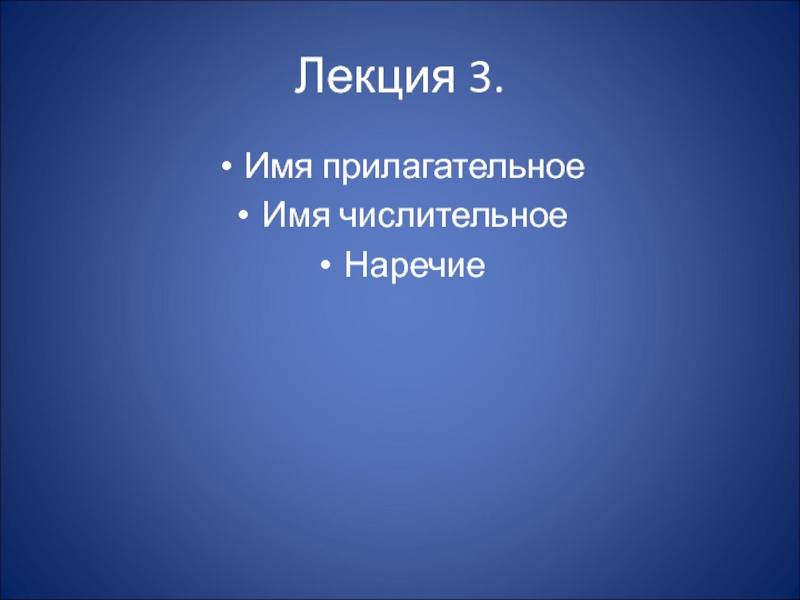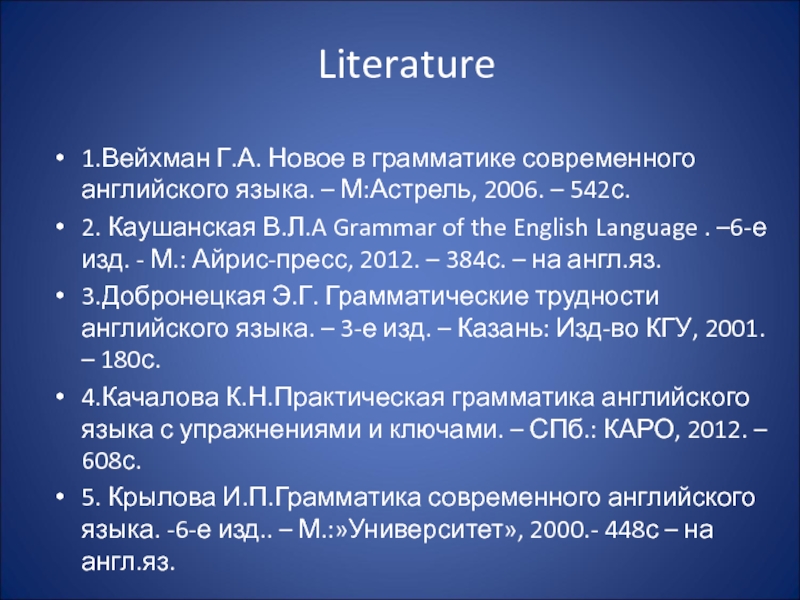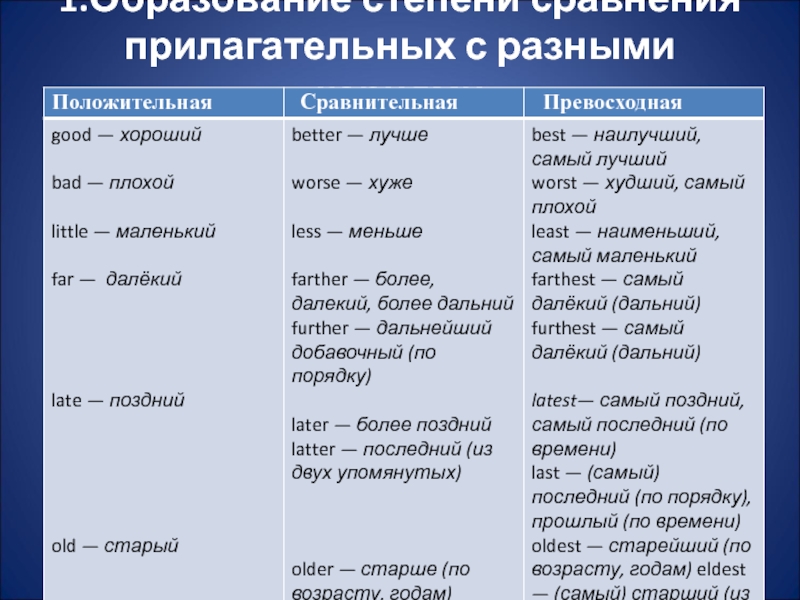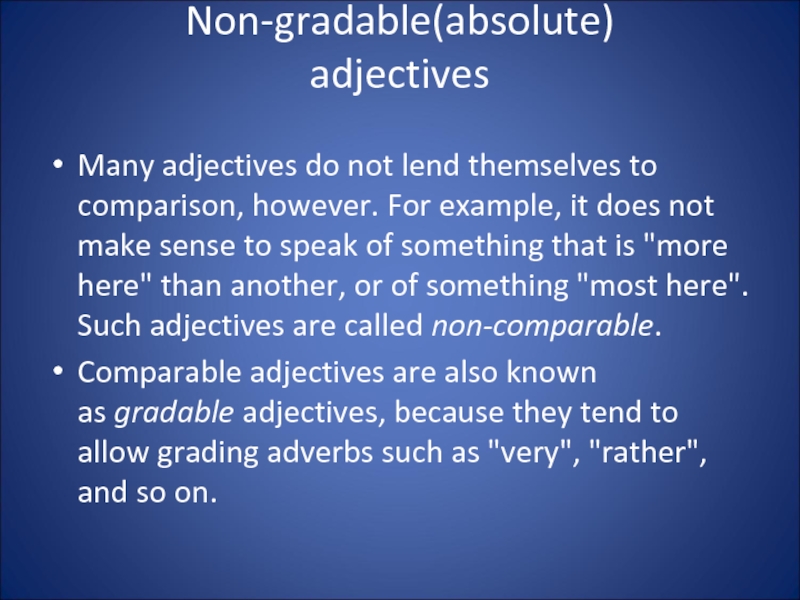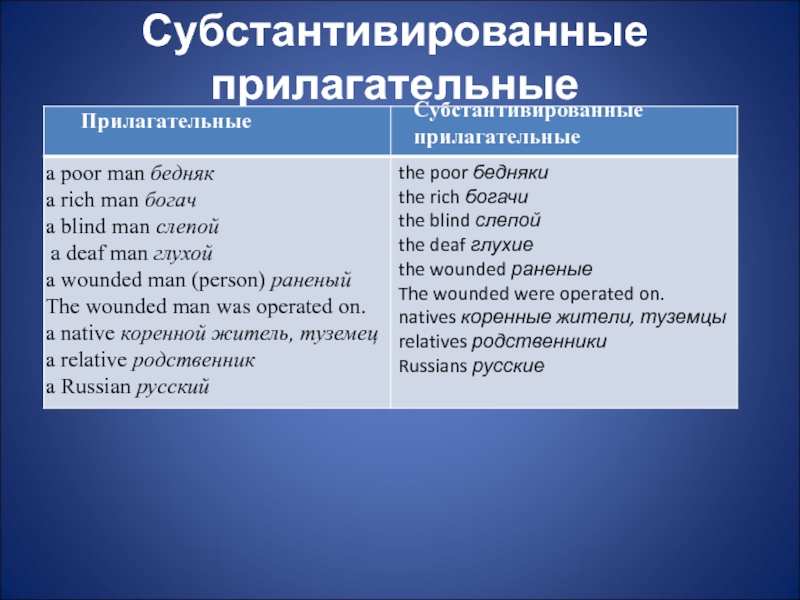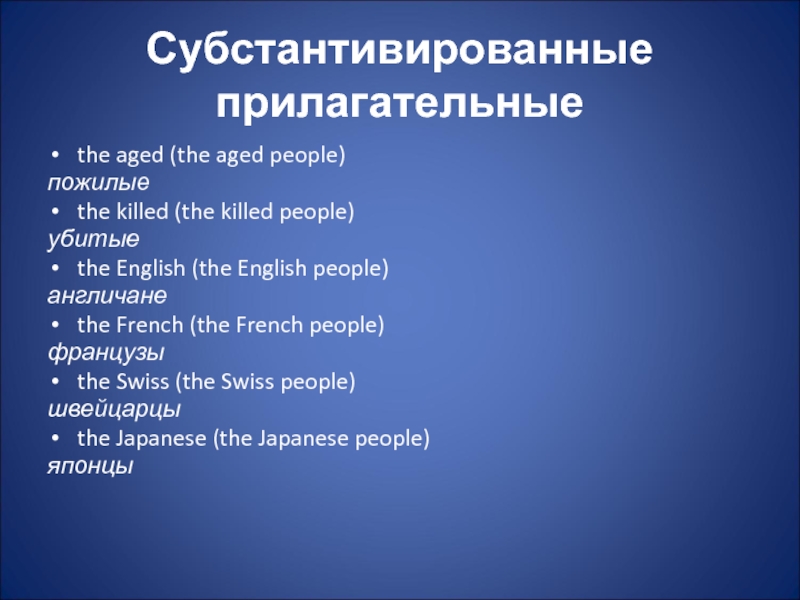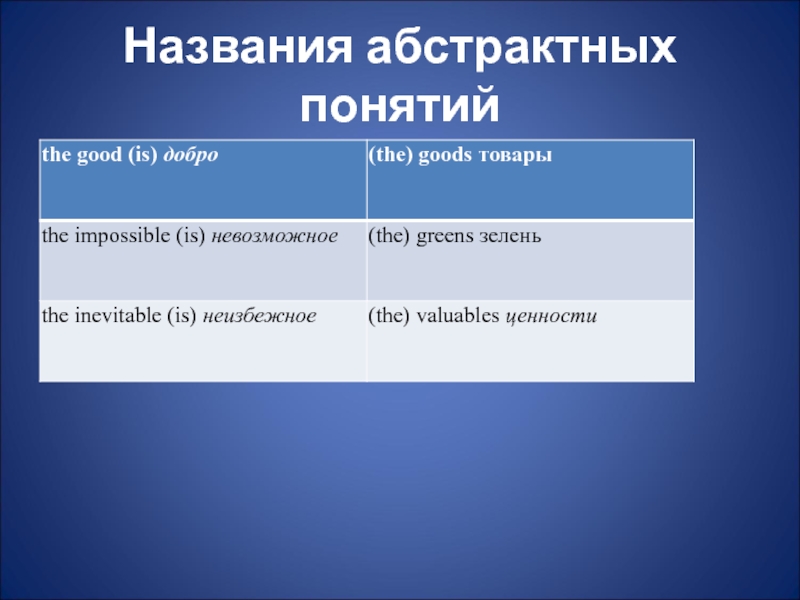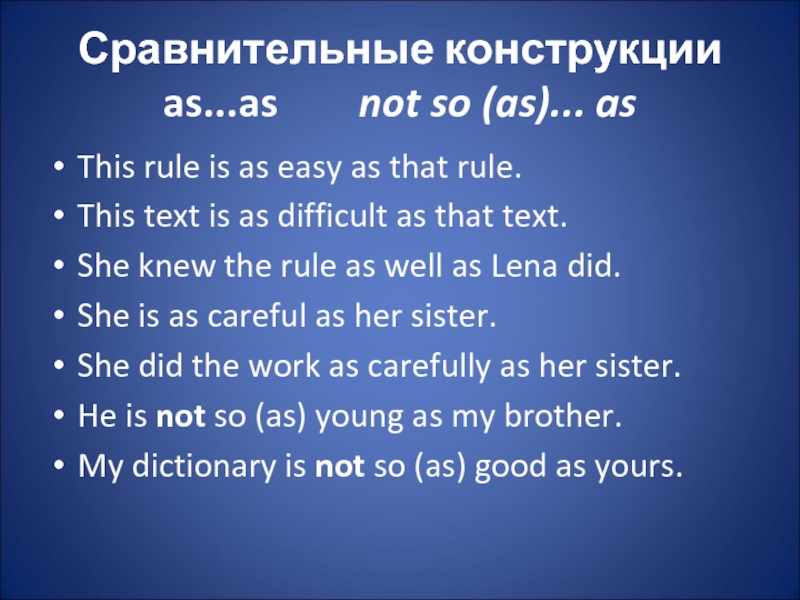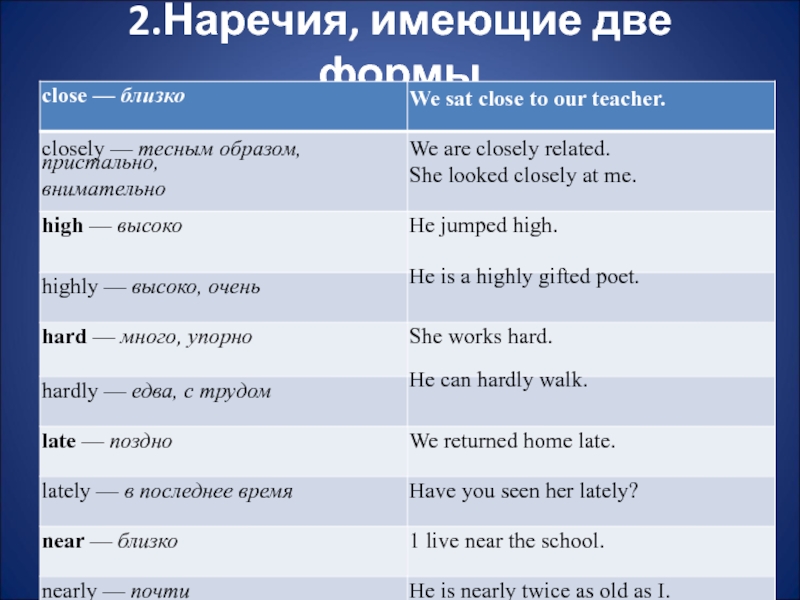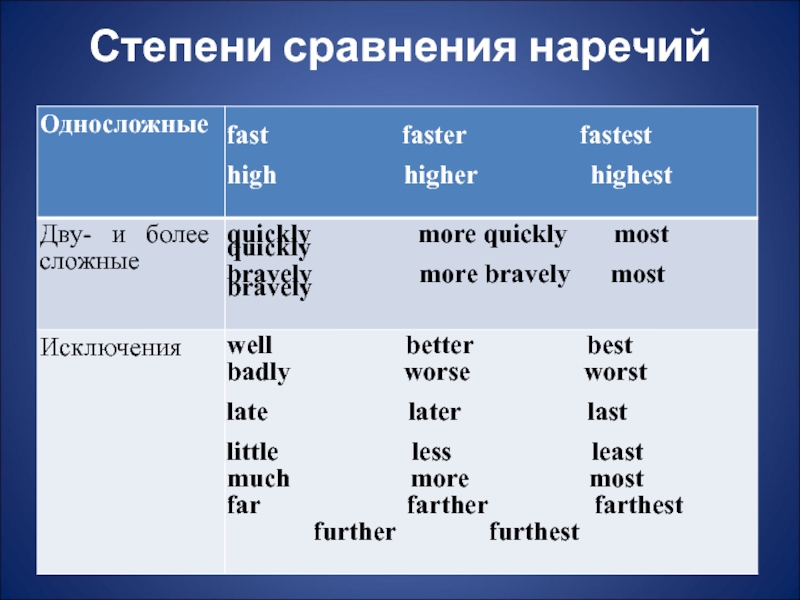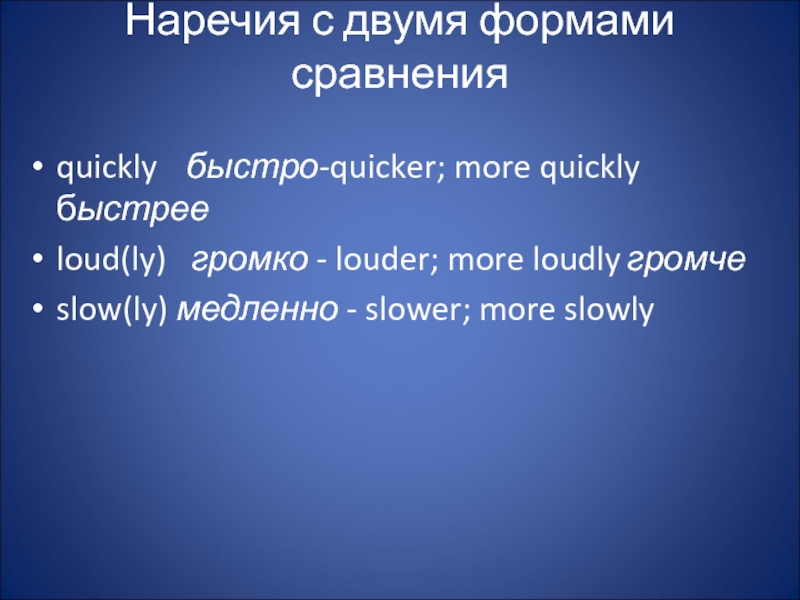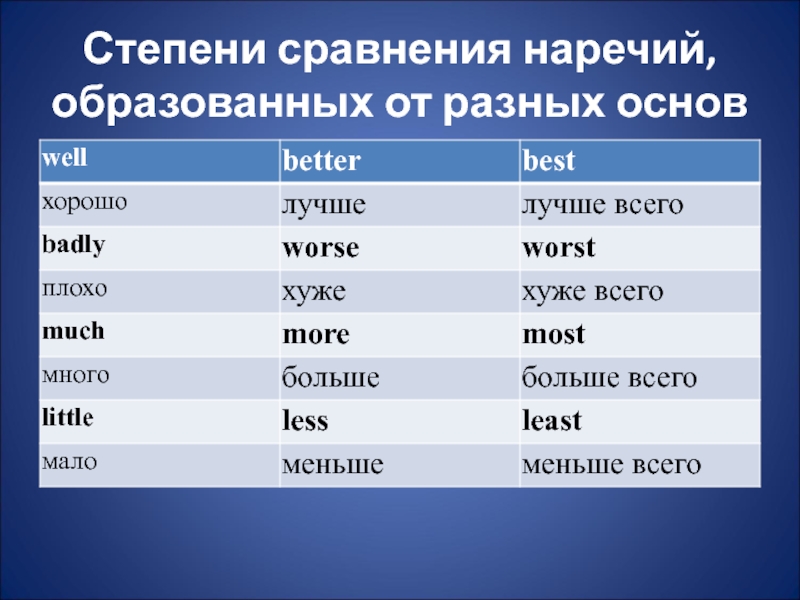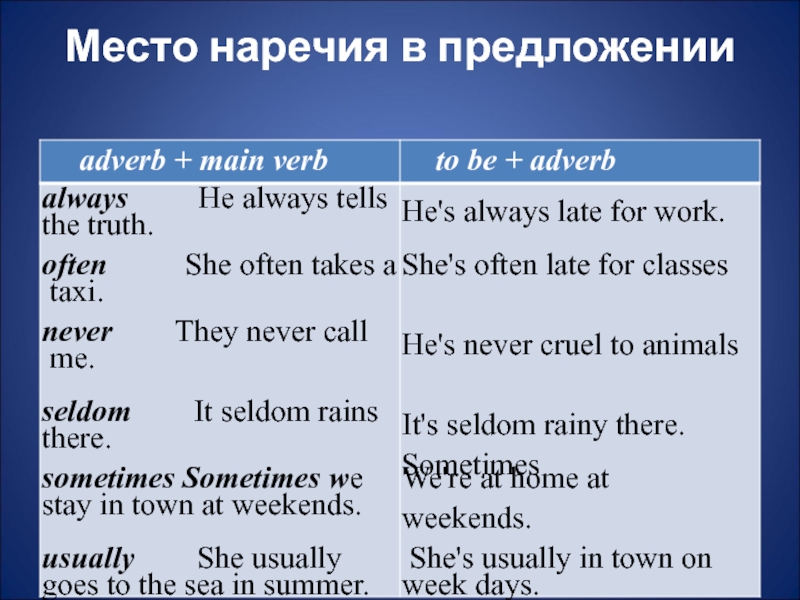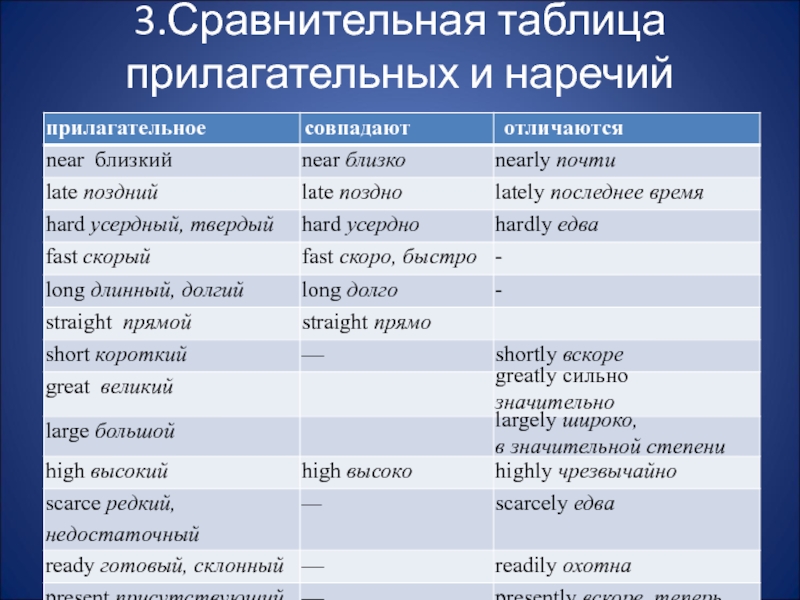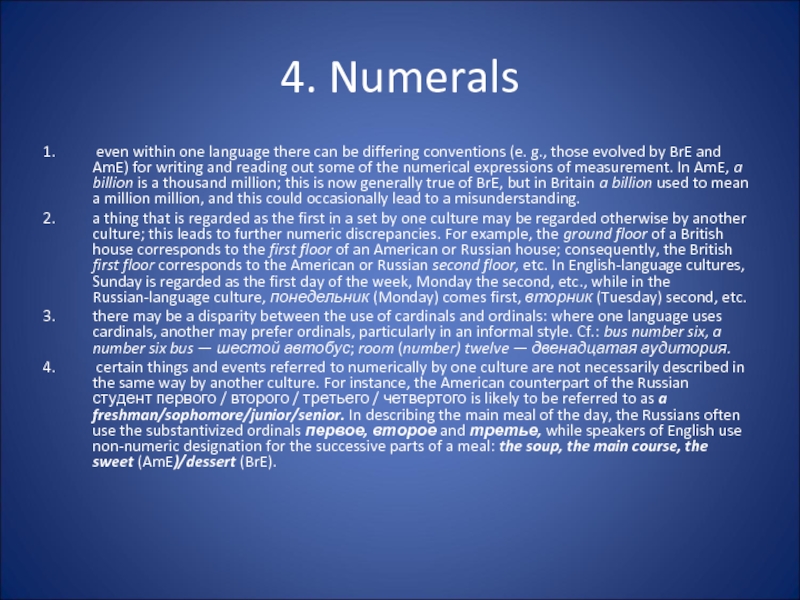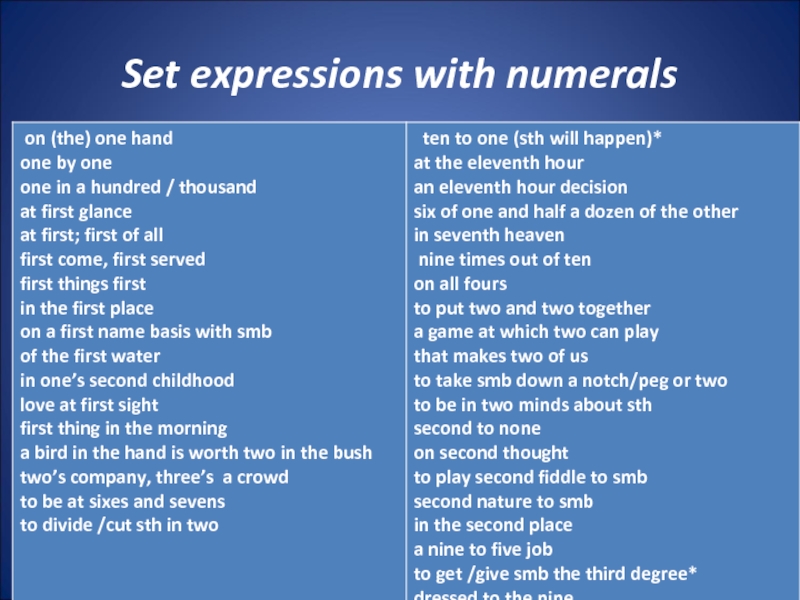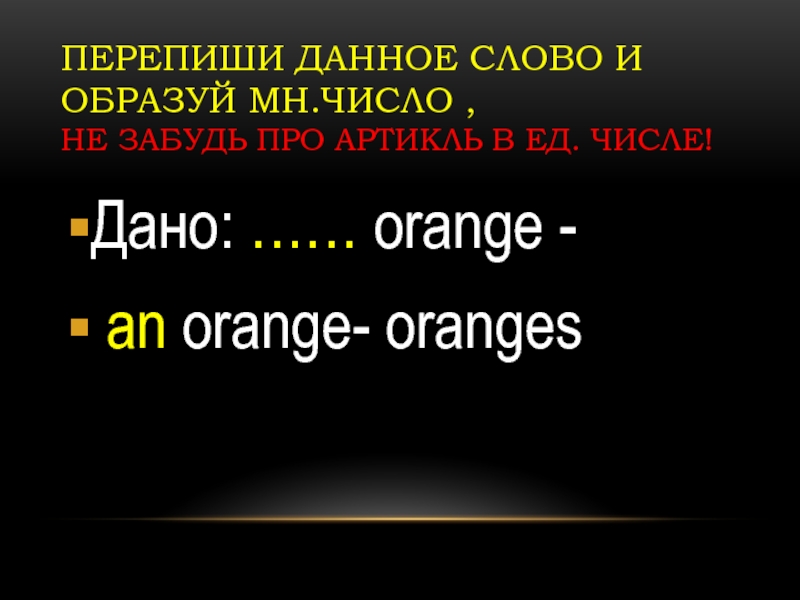- Главная
- Разное
- Дизайн
- Бизнес и предпринимательство
- Аналитика
- Образование
- Развлечения
- Красота и здоровье
- Финансы
- Государство
- Путешествия
- Спорт
- Недвижимость
- Армия
- Графика
- Культурология
- Еда и кулинария
- Лингвистика
- Английский язык
- Астрономия
- Алгебра
- Биология
- География
- Детские презентации
- Информатика
- История
- Литература
- Маркетинг
- Математика
- Медицина
- Менеджмент
- Музыка
- МХК
- Немецкий язык
- ОБЖ
- Обществознание
- Окружающий мир
- Педагогика
- Русский язык
- Технология
- Физика
- Философия
- Химия
- Шаблоны, картинки для презентаций
- Экология
- Экономика
- Юриспруденция
Имя прилагательное. Имя числительное. Наречие презентация
Содержание
- 1. Имя прилагательное. Имя числительное. Наречие
- 2. Literature 1.Вейхман Г.А. Новое в грамматике
- 3. 1.Образование степени сравнения прилагательных с разными корнями
- 4. Non-gradable(absolute) adjectives Many adjectives do not
- 5. Субстантивированные прилагательные
- 6. the aged (the aged people) пожилые the
- 7. Названия абстрактных понятий
- 8. Сравнительные конструкции as...as
- 9. 2.Наречия, имеющие две формы
- 10. Степени сравнения наречий
- 11. Наречия с двумя формами сравнения quickly быстро-quicker;
- 12. Степени сравнения наречий, образованных от разных основ
- 13. Место наречия в предложении
- 14. 3.Сравнительная таблица прилагательных и наречий
- 15. 4. Numerals even within one language
- 16. Set expressions with numerals
Слайд 2Literature
1.Вейхман Г.А. Новое в грамматике современного английского языка. – М:Астрель, 2006.
– 542с.
2. Каушанская В.Л.A Grammar of the English Language . –6-е изд. - М.: Айрис-пресс, 2012. – 384с. – на англ.яз.
3.Добронецкая Э.Г. Грамматические трудности английского языка. – 3-е изд. – Казань: Изд-во КГУ, 2001. – 180с.
4.Качалова К.Н.Практическая грамматика английского языка с упражнениями и ключами. – СПб.: КАРО, 2012. – 608с.
5. Крылова И.П.Грамматика современного английского языка. -6-е изд.. – М.:»Университет», 2000.- 448с – на англ.яз.
2. Каушанская В.Л.A Grammar of the English Language . –6-е изд. - М.: Айрис-пресс, 2012. – 384с. – на англ.яз.
3.Добронецкая Э.Г. Грамматические трудности английского языка. – 3-е изд. – Казань: Изд-во КГУ, 2001. – 180с.
4.Качалова К.Н.Практическая грамматика английского языка с упражнениями и ключами. – СПб.: КАРО, 2012. – 608с.
5. Крылова И.П.Грамматика современного английского языка. -6-е изд.. – М.:»Университет», 2000.- 448с – на англ.яз.
Слайд 4Non-gradable(absolute)
adjectives
Many adjectives do not lend themselves to comparison, however. For example,
it does not make sense to speak of something that is "more here" than another, or of something "most here". Such adjectives are called non-comparable.
Comparable adjectives are also known as gradable adjectives, because they tend to allow grading adverbs such as "very", "rather", and so on.
Comparable adjectives are also known as gradable adjectives, because they tend to allow grading adverbs such as "very", "rather", and so on.
Слайд 6the aged (the aged people)
пожилые
the killed (the killed people)
убитые
the English (the
English people)
англичане
the French (the French people)
французы
the Swiss (the Swiss people)
швейцарцы
the Japanese (the Japanese people)
японцы
англичане
the French (the French people)
французы
the Swiss (the Swiss people)
швейцарцы
the Japanese (the Japanese people)
японцы
Субстантивированные прилагательные
Слайд 8Сравнительные конструкции
as...as not so (as)... as
This rule
is as easy as that rule.
This text is as difficult as that text.
She knew the rule as well as Lena did.
She is as careful as her sister.
She did the work as carefully as her sister.
He is not so (as) young as my brother.
My dictionary is not so (as) good as yours.
This text is as difficult as that text.
She knew the rule as well as Lena did.
She is as careful as her sister.
She did the work as carefully as her sister.
He is not so (as) young as my brother.
My dictionary is not so (as) good as yours.
Слайд 11Наречия с двумя формами сравнения
quickly быстро-quicker; more quickly быстрее
loud(ly) громко -
louder; more loudly громче
slow(ly) медленно - slower; more slowly
slow(ly) медленно - slower; more slowly
Слайд 154. Numerals
even within one language there can be differing conventions
(e. g., those evolved by BrE and AmE) for writing and reading out some of the numerical expressions of measurement. In AmE, a billion is a thousand million; this is now generally true of BrE, but in Britain a billion used to mean a million million, and this could occasionally lead to a misunderstanding.
a thing that is regarded as the first in a set by one culture may be regarded otherwise by another culture; this leads to further numeric discrepancies. For example, the ground floor of a British house corresponds to the first floor of an American or Russian house; consequently, the British first floor corresponds to the American or Russian second floor, etc. In English-language cultures, Sunday is regarded as the first day of the week, Monday the second, etc., while in the Russian-language culture, понедельник (Monday) comes first, вторник (Tuesday) second, etc.
there may be a disparity between the use of cardinals and ordinals: where one language uses cardinals, another may prefer ordinals, particularly in an informal style. Cf.: bus number six, a number six bus — шестой автобус; room (number) twelve — двенадцатая аудитория.
certain things and events referred to numerically by one culture are not necessarily described in the same way by another culture. For instance, the American counterpart of the Russian студент первого / второго / третьего / четвертого is likely to be referred to as a freshman/sophomore/junior/senior. In describing the main meal of the day, the Russians often use the substantivized ordinals первое, второе and третье, while speakers of English use non-numeric designation for the successive parts of a meal: the soup, the main course, the sweet (AmE)/dessert (BrE).
a thing that is regarded as the first in a set by one culture may be regarded otherwise by another culture; this leads to further numeric discrepancies. For example, the ground floor of a British house corresponds to the first floor of an American or Russian house; consequently, the British first floor corresponds to the American or Russian second floor, etc. In English-language cultures, Sunday is regarded as the first day of the week, Monday the second, etc., while in the Russian-language culture, понедельник (Monday) comes first, вторник (Tuesday) second, etc.
there may be a disparity between the use of cardinals and ordinals: where one language uses cardinals, another may prefer ordinals, particularly in an informal style. Cf.: bus number six, a number six bus — шестой автобус; room (number) twelve — двенадцатая аудитория.
certain things and events referred to numerically by one culture are not necessarily described in the same way by another culture. For instance, the American counterpart of the Russian студент первого / второго / третьего / четвертого is likely to be referred to as a freshman/sophomore/junior/senior. In describing the main meal of the day, the Russians often use the substantivized ordinals первое, второе and третье, while speakers of English use non-numeric designation for the successive parts of a meal: the soup, the main course, the sweet (AmE)/dessert (BrE).
